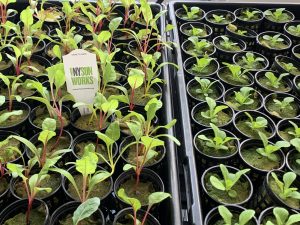Indoors or Outside, Growing Plants Helps Support Students’ Emotional Well-Being
In a regular year, time in our Greenhouse Classrooms doesn’t just help students build proficiency in STEM and sustainability — it also supports students in their social-emotional learning. Now, with access to the Greenhouse Classrooms limited due to COVID and with many students learning remotely, our Home Hydroponic Kits are filling this role instead. The Kits are designed to engage students with topics they would otherwise learn about in their Greenhouse Classrooms. But the hydroponic kit lessons also deliberately incorporate activities to foster social-emotional well-being. For example, each day, students are tasked with observing and tending to their plants, creating a stabilizing routine and something to look forward to each day. The opportunity to share their progress and challenges with their classmates and teachers fosters a spirit of collaboration and curiosity as students talk about what has worked and why. And sharing food with their family – even just a leaf or two of kale or herbs – creates a deep sense of pride and brings the whole family into the learning experience.
Whether in the Greenhouse Classrooms, at home with a plant on the windowsill, or outside in a garden plot, students gain a wealth of scientific knowledge and farming know-how from tending plants. But just as important as academic learning are the emotional benefits that come from cultivating plants — the sense of responsibility in caring for a living, growing thing, the pride and confidence in helping it grow, and the stability that comes from a daily gardening routine. These benefits — always important to a child’s social-emotional well-being – have become even more crucial now as students contend with the uncertainty and instability of their lives during the pandemic.
Numerous studies have confirmed what gardeners intuitively know: that gardening and growing food promote emotional well-being. The benefits range from reducing stress and anxiety to elevating mood and alleviating depression. Among students, caring for plants has been shown to foster a sense of responsibility, accomplishment, and self-confidence; growing edible plants has the added benefit of helping students develop more healthful eating habits and a more positive relationship with food. Caring for plants is also a way for students to grow their community, as they bond with classmates over the successes and challenges of cultivating plants and share their progress and the food they’ve grown with their family and neighbors.
All of these benefits fall within the broad category of Social-Emotional Learning (SEL). An important part of K-12th grade educational programs, SEL is the idea of supporting students in understanding and managing their emotions, building self-confidence, and learning to communicate constructively with others. In science, SEL extends to helping students gain confidence to ask questions and explore new ideas, to know it’s okay to try and not have an idea work out as hoped, and to collaborate and build trust with their classmates. In designing, implementing, and analyzing experiments, students find agency, confidence and a sense of control that carry over into other aspects of their academic and personal lives.
Students are contending this year with so many questions they shouldn’t have to ask: Will I get sick if I go to school? Will remote learning be enough? Will my parents be safe in their front-line jobs? In many of our partner schools, students face the added daily stresses of food insecurity, family members out of work, and high death counts in their communities. As educators, we must use every tool we have to support students through this difficult time. The chance to cultivate a plant, to experience the joy of watching it grow, to harvest and share the food they’ve grown with their families and school community, is the chance for students to build the resilience and confidence they need and deserve.
FRIENDS OF NY SUN WORKS
Join Our Mission to Grow Tomorrow’s Climate Leaders.
















